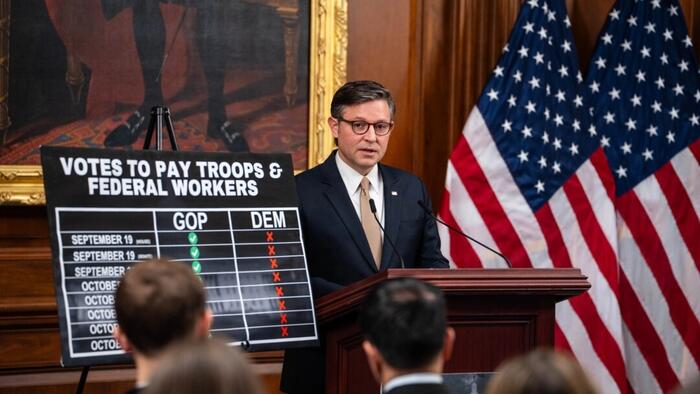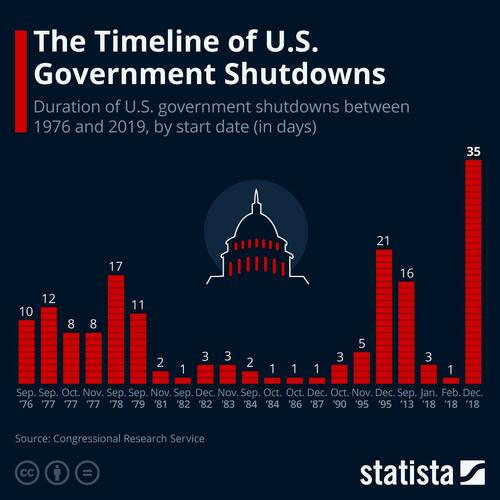


Authored by Jacob Burg via The Epoch Times,
House Speaker Mike Johnson (R-La.) said on Oct. 13 that he thinks the ongoing federal government shutdown might become the longest in the nation’s history, and that he “won’t negotiate” with Democrats until they abandon their health care demands to reopen.
Speaking to reporters at the Capitol on the shutdown’s 13th day, Johnson said he wasn’t aware of the details surrounding the Trump administration laying off thousands of federal workers during the lapse in funding.
Some critics, including Democrats, have cast the mass layoffs as a way for the administration to reduce the size of the federal government.
“We’re barreling toward one of the longest shutdowns in American history,” Johnson said.
With negotiations between Democrats and Republicans at a stalemate, the shutdown is expected to endure for the foreseeable future.
Not only have routine government operations been impacted or paused, but the Smithsonian museums and other cultural institutions have closed their doors.
American air travel has also been impacted, with the shutdown exacerbating an existing shortage of air traffic controllers, leading to delays at airports nationwide.
Treasury Secretary Scott Bessent said Monday that the shutdown had already begun to affect the U.S. economy but did not elaborate.
The House of Representatives is currently out of legislative session, and Johnson has thus far not called lawmakers back to Washington after the lower chamber passed the GOP-backed continuing resolution to reopen the government. The Senate will return to work Tuesday after being closed for a federal holiday on Monday.
The Senate GOP needs 60 votes on its continuing resolution, which extended government funding at the existing level before the shutdown, to reopen the government. Senate Majority Leader John Thune (R-S.D.) has pinned blame on Democrats, who have insisted on a permanent extension to certain COVID-19 era health care subsidies that are expiring this year.
Democrats say millions of Americans who rely on the Affordable Care Act for health insurance will see subsidies expiring in December, leading to rising costs. Republicans have said the issue should be discussed after the government reopens.
With open enrollment for the Affordable Care Act set to begin on Nov. 1, some Americans may see their monthly health insurance premiums “more than double” with next year’s enrollment if Congress does not extend the subsidies expiring on Dec. 31, according to estimates from the Kaiser Family Foundation.
One of the Democrats who has voted for the Senate GOP-backed continuing resolutions is Sen. John Fetterman (D-Pa.), who on Sunday criticized his party for sending the wrong signal on the shutdown.
“Now, I fully support—let’s have a conversation to extending those tax credits,” Fetterman said. “I think a lot of Republicans might even agree with that, too. ... That’s a priority for us, and they might agree. But, you know, let’s have our government open and have that conversation so people can get paid.”
This is not the first government shutdown tied to health care policy.
When Republicans tried to repeal the Affordable Care Act in 2013, it resulted in a 16-day government shutdown.
However, the longest shutdown in U.S. history ended in 2019 after 35 days, when Republicans were requesting funds from Congress to build a wall at the U.S.-Mexico border during Trump’s first term. The president eventually backed off amid mounting pressure from delays at the nation’s airports and missed paydays for federal workers.

